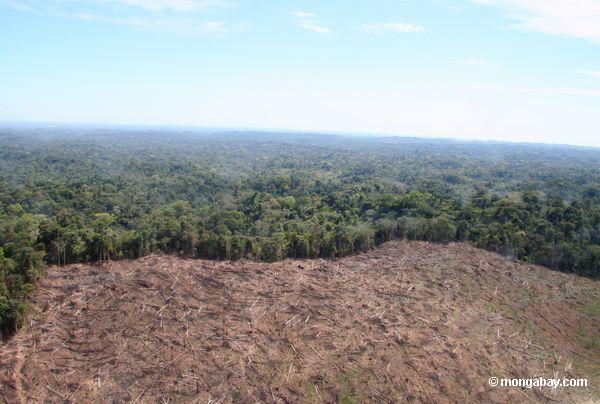New Frontiers in Greenwashing

The problem with these poorly regulated carbon market schemes is that the replicate the exact same problems that is destroying the planet’s ecosystem to begin with. This is a great example of the problem.
At the entrance to its sprawling tract of virgin Amazon rainforest, the Peruvian timber company Maderacre turns ancient hardwood trees into flooring on an industrial scale.
Beside the vast, modern facility, a reddish dirt road leads into the jungle where workers harvestwood that takes centuries to mature.
As it systematically removes the oldest trees from this stunning wilderness, Maderacre might seem an improbable seller of carbon credits, the financial instrument that in theory allows consumers and corporations to “offset” their greenhouse gas emissions from air travel, ride-hailing apps, fashion purchases and other pollution-producing activities.
The company isn’t earning credits by planting trees to absorb carbon dioxide. The offsets it sells are based on a hypothetical: An estimate of how many existing trees it prevents from being cut down.
There’s a logic to this. Maderacre argues that unlike its neighbors — illegal loggers and homesteaders — it’s carrying out selective, sustainable logging on its 1,000-square-mile timber concession that maintains the forest’s ecological balance.
But the approach, known as Reducing Emissions from Deforestation and Degradation, or REDD+, raises questions about how to protect the world’s forests, which sequester billions of tons of carbon, and about the booming carbon credit market. As the window to avoid catastrophic climate change closes, scientists are questioning the intricate methodologies used to calculate this lucrative counterfactual, known as “avoided deforestation.”
Some warn that it might actually be accelerating the climate crisis, as consumers, instead of curbing their emissions, buy credits that do not deliver on their green promises.
The stark contrast between Maderacre’s lush concession and the barren land around it makes the benefits of offsets seem obvious. Pressing up against the forest’s perimeter is a patchwork of dusty fields cleared by unregulated deforesters in a chaotic rush to settle this remote region.
Household brands such as Shell, Southwest Airlines, Disney and Gucci all have used credits generated this way.
Fundamentally, the problem is trusting a poorly regulated international capitalism that incentives corporate profits based on escaping all regulations possible. I don’t have a problem per se with market-based incentives in terms of dealing with climate change. I am highly skeptical, yes, but we deal with the system we have. But actually trusting this system? We’ve already seen how easy it is for companies to skirt regulations in sweatshops, for instance. Why would we think this would ever work without a very real international regulatory agency and actual punishment for the corporate violators? It’s ridiculous to think otherwise.
Also, if the timber industry supports something, you know it is bad.


